Related Research Articles
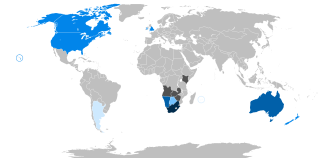
Afrikaans is a West Germanic language spoken in South Africa, Namibia, and, to a lesser extent, Botswana, Zambia, and Zimbabwe. It evolved from the Dutch vernacular of Holland spoken by the European settlers and their slaves in South Africa, where it gradually began to develop distinguishing characteristics during the course of the 18th century. Afrikaans is considered by most linguists to be partially, rather than fully, a creole language. Afrikaans linguistics scholars likewise consider it only partially creole.

The Bantu languages are a large family of languages spoken by the Bantu peoples of Central, Southern, and Southeast Africa. They form the largest branch of the Southern Bantoid languages.

South African English is the set of English language dialects native to South Africans.

Zulu, or isiZulu as an endonym, is a Southern Bantu language of the Nguni branch spoken in Southern Africa. It is the language of the Zulu people, with about 12 million native speakers, who primarily inhabit the province of KwaZulu-Natal of South Africa. Zulu is the most widely spoken home language in South Africa, and it is understood by over 50% of its population. It became one of South Africa's 11 official languages in 1994.
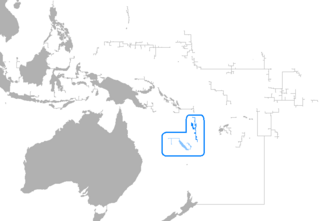
Bislama is an English-based creole language and one of the official languages of Vanuatu. It is the first language of many of the "Urban ni-Vanuatu" and the second language of much of the rest of the country's residents. The lyrics of "Yumi, Yumi, Yumi", the country's national anthem, are composed in Bislama.
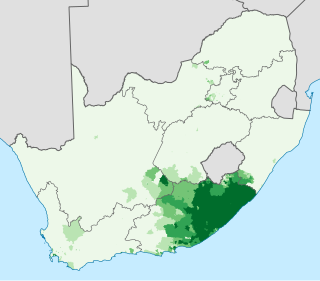
Xhosa also isiXhosa as an endonym, is a Nguni language and one of the official languages of South Africa and Zimbabwe. Xhosa is spoken as a first language by approximately 8.2 million people and by another 11 million as a second language in South Africa, mostly in Eastern Cape, Western Cape, Gauteng and Northern Cape. It has perhaps the heaviest functional load of click consonants in a Bantu language, with one count finding that 10% of basic vocabulary items contained a click.
Sotho or Sesotho is a Southern Bantu language of the Sotho-Tswana (S.30) group, spoken primarily by the Basotho in Lesotho, where it is the national and official language; South Africa, where it is one of the 11 official languages; and in Zimbabwe where it is one of 16 official languages.

The following are lists of words in the English language that are known as "loanwords" or "borrowings," which are derived from other languages.

Kraal is an Afrikaans and Dutch word, also used in South African English, for an enclosure for cattle or other livestock, located within a Southern African settlement or village surrounded by a fence of thorn-bush branches, a palisade, mud wall, or other fencing, roughly circular in form. It is similar to a boma in eastern or central Africa.

Disa is a genus of flowering plants in the family Orchidaceae. It comprises about 182 species. Most of the species are indigenous to tropical and southern Africa, with a few more in the Arabian Peninsula, Madagascar, and Réunion. Disa bracteata is naturalised in Western Australia, where the local name is "African weed-orchid."
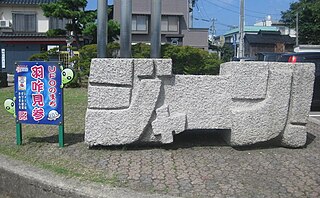
Ideophone is a word class evoking ideas in sound imitation or onomatopoeia to express action, manner of property. Ideophone is the least common syntactic category cross-linguistically occurring mostly in African, Australian and Amerindian languages, and sporadically elsewhere. It is globally the only known word class exotic to English. Ideophones resemble interjections but are unclassifiable as such owing to their special phonetic or derivational characteristics, and based on their syntactic function within the sentence. They may include sounds that deviate from the language's phonological system, imitating—often in a repetitive manner—sounds of movement, animal noises, bodily sounds, noises made by tools or machines, and the like.

An assegai or assagai is a pole weapon used for throwing, usually a light spear or javelin made up of a wooden handle and an iron tip.

Colocasia esculenta is a tropical plant grown primarily for its edible corms, a root vegetable most commonly known as taro, among many other names. It is the most widely cultivated species of several plants in the family Araceae that are used as vegetables for their corms, leaves, and petioles. Taro corms are a food staple in African, Oceanic, and South Asian cultures, and taro is believed to have been one of the earliest cultivated plants.
Fanagalo, or Fanakalo, is a vernacular or pidgin based primarily on Zulu with input from English and a small amount of Afrikaans input. It is used as a lingua franca, mainly in the gold, diamond, coal and copper mining industries in South Africa and to a lesser extent in the Democratic Republic of the Congo, Namibia, Zambia, and Zimbabwe. Although it is used as a second language only, the number of speakers was estimated as "several hundred thousand" in 1975. By the time independence came – or in the case of South Africa, universal suffrage – English had become sufficiently widely spoken and understood that it became the lingua franca, enabling different ethnic groups in the same country to communicate with each other, and Fanakalo use declined.
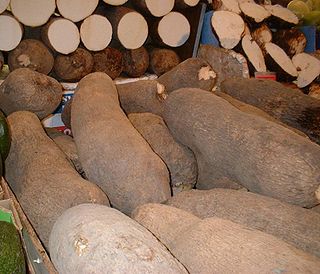
Yam is the common name for some plant species in the genus Dioscorea that form edible tubers. Yams are perennial herbaceous vines cultivated for the consumption of their starchy tubers in many temperate and tropical regions, especially in West Africa, South America and the Caribbean, Asia, and Oceania. The tubers themselves, also called "yams", come in a variety of forms owing to numerous cultivars and related species.
In South African English, a tagati is a wizard, witch, or a spiteful person who operates in secret to harm others or who uses poisons and familiar spirits to carry out harmful deeds. The term is first recorded in 1836; it derives from the Zulu word umthakathi, being someone who mixes medicine. The word umthakathi itself comes from two Zulu words thaka (mix) and muthi (medicine).

Lexico was a dictionary website that provided a collection of English and Spanish dictionaries produced by Oxford University Press (OUP), the publishing house of the University of Oxford. While the dictionary content on Lexico came from OUP, this website was operated by Dictionary.com, whose eponymous website hosts dictionaries by other publishers such as Random House.
Nakanai is spoken by the Nakanai tribe in West New Britain, a province of Papua New Guinea. It is an Austronesian language, belonging to the Malayo-Polynesian subgroup. Otherwise known as Nakonai, it also has dialects in the form of Losa, Bileki, Vere, Ubae, and Maututu.
References
- 1 2 3 4 5 Oxford English Dictionary. Oxford: Oxford University Press. 2010.
- ↑ "umfundisi". Oxford living dictionaries. Archived from the original on 13 June 2018.